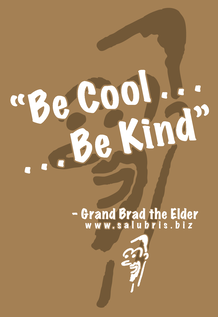 As of the writing of this post, I have lately been fielding calls/texts/emails from people wanting to help me navigate my medicare choices. In other words, I’m about to turn 65. I’m not sure why, but something about that has me considering the big picture of life, what it’s really about and how to make it count. The result of all the reflectation (that’s totally a word: I just read it), is my new brand and my new motto (wait: what was the old one again?). My Brand Although I have no biological grand-children as of this writing, I’ve spent some amount of time in the last few years with a small human and have somehow gained the moniker “GrandBrad.” I decided I kind of dig the ring of that. The other piece is that when I say things like “I kind of dig,” it reveals that Brad is no spring chicken. Having lived six and half decades now, I qualify to take part in one of the conversations going on out there around the question of healthy aging, which is the notion that rather than consigning our aging selves to dysfunction and disuse to be warehoused in a home somewhere until we check out, we can join the ranks of so-called “elders,” as has been the tradition in so many cultures. Folks who see the final quarter (or so) of life as a time to pass on some of what they’ve learned and experienced. In one of the plethora of articles I’ve read about this sort of thing lately I ran across a 100+ woman who, alongside her gardening and social activities, continued her weekly commitment to “Grandma school.” I dug that too. So as part of my Ikigai (Japanese term for purpose to live, what gets you up in the morning), I think I’ll work on the curriculum for “GrandBrad school.” There could be a lot included in that: things like non-violent communication, other people skills like active listening, mindfulness training, how to cut up a chicken and cook it, using a hammer, cleaning a fish, whatever. Right at this moment I’ve been asking this question that derives from my religious background and former pastoral vocation: “in a post-religious, post-church world, what kind of spiritual direction (if any) do we offer our children?” As I have engaged with the conversations going on out there with my “exvangelical” friends, I have concluded for myself that the religion I grew up with does not have to be discarded entirely, but can be updated to still play a role in developing a worldview that works. The beginning of that process for me has been to simply update the lexicon: the words and phrases that have characterized that tradition. You can read my current list on my spirituality blog here. There are a couple of bottom lines for me with regard to this eldering thing, especially as it relates to the upcoming generation. I would feel successful in this endeavor if I can play a role in helping shape little humans who can someday help us answer the “what’s next” question that I have. In other words, in a world where our religious, economic, and political systems have failed to achieve what we thought they would, what’s next? I believe that in order for us to survive, or at least not to have to go through a bunch of gross stuff to do so, we will have to achieve a quantum leap in human consciousness, and the coming generation may be our last chance to do that. In a practical sense, if I can help any small human get to the point where I can remind them of my motto on the first day of school, and they’ll know just what I’m talking about and how to do it, I would feel like at some level I will have got to mission accomplished. Which brings me to the 2 aspects of my new motto: Be cool. One of the things this many decades will teach you is that a whole lot of what you used to think was critically important really isn’t so much. I’ve learned through experience as well as my association with the contemplative traditions (primarily from my own faith background but increasingly others as well), as well as the more science based processes of things like Mindfulness Based Stress Reduction (MBSR), that most, if not all, of what I used to consider threats to my being really have no impact on who I really am at the core. Being one of the cool kids to me is not so much about looks, athleticism, smarts, any of the rest: it’s about how good you are at the art of chill. If we’re talking popularity here, that’s what will put you at the top, simply because it is the foundation for accomplishing the other half of my motto: Be kind. Learning the art of chill sets you up for accomplishing the art of kindness. It’s all the dumb stuff that you think are threats (but really aren’t) that will set off your fight-or-flight response and make you hostile, and learning to let them go and get re-centered in your safe place is the key to kindness and compassion. I have come to think of this as so much more than just a way to be one of the cool kids: I really believe it is the way we accomplish our meaning and purpose in this world. In my spiritual study and reflection and contemplation, I have come to be convinced of what is now increasingly supported by science: that this Universe is how the divine reality is manifesting themselves and is evolving, not in random ways, but with purpose and intention toward a reality based on kindness, compassion, connectivity, justice….love. It is all the acts of kindness that conform to that intention that is our part to play in getting to the end game with all of this. Regardless of whether you agree with that woo-woo of a worldview, the fact remains that as you get to the place where you’re like me and are asking what it will all have meant when you’re looking back at it, what’s the downside to living like that? Seeing a life of accumulated acts of kindness will, in my view, mean much more to you and help you check out with joy than how low the numbers are on your golf card or how high they are on your odometer or your balance sheet. So that’s my brand, and that’s my motto. We’ll see where it goes from here.
0 Comments
ecently I returned to the very beginning of my master menu planning spreadsheet I started when the Nutrition Kitchen began. As it turns out, my first menu of meal prep for breakfast, lunch and dinner for healthy eating was April of 2012: exactly 10 years ago. So it's been decade of helping people exchange their SAD (standard American diet) for food designed to recalibrate their metabolism for fat burning and maximum immune function. I have witnessed what that kind of a switch can do and how, as Hippocrates said, food really is medicine. So I watched the Nutrition Kitchen grow from one of the things I did as a chef to the only thing. Because making food more convenient for people who don’t want to cook or don’t have time as I was doing as personal chef is useful, but helping people become healthier, even to the point of being free of their diabetes and hypertension, is truly something to get out of bed for. This is what the Japanese call Ikigai, your reason or purpose for engaging with the day ahead of you. All along I had in my head the notion that the Nutrition Kitchen as I designed it could have a broader impact if I had the marketing and business sense to expand it, but alas it remained me and a few clients a week until my recent retirement from chef work. I purposed at that point to shift my Ikigai to exploring broader issues of healthy aging beyond just proper nutrition. Types and forms of movement such as Tai Chi, and ways to support cognitive health and the inner life such as Mindfulness Based Stress Reduction are things that I know can help oldsters like me to avoid the dysfunction, chronic disease and cognitive decline that causes so much optional misery for people in America, especially later in life.
Then along comes Richard Tam and Chef Century, wanting to put the Nutrition Kitchen back out there for public consumption. So with some assurances that my 10 hour days in the kitchen would still be behind me, I somewhat reluctantly agreed to reinstate my self awareness as a chef for menu planning and recipe creation for metabolically supportive nutrition. And as I am able, I will continue to pursue these other issues of wellness and perhaps find a way to help some other people do what, at almost 64 years old, I intend: to have decades yet available to me to discover all the reasons to get out of bed in the morning and make what contribution I can. To discover and pursue my Ikigai. 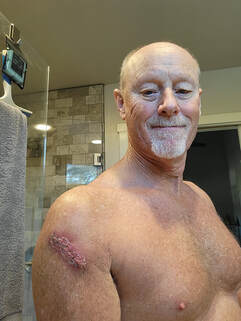 So there I was, in my 63rd year of life on this planet and getting my first skin exam by a dermatologist. She asked about time spent in the sun and I replied truthfully: that I attempted to achieve 10-20 minutes a day as fully exposed as possible on doctor’s orders. That’s when I got the look. And the inevitable “well I don’t agree with that!” after which she began to identify all the areas of my body that needed to be addressed. Now after two visits I have work to do on my story about an encounter with a shark to explain the 3 gnarly scars from incisions with God knows how many stitches. Also a few other spots that they “scraped and burned,” etc., along with the usual advice you get from skin doctors to just “stay out of the sun.” Now begins the experience of people who have known me to joyfully shame me over what is perceived as my reckless relationship to el Sol. All attempts to try to defend myself have failed utterly, so I decided to stop wasting my energies which I need so badly to fight off all the ravages to this battered old body that my bad behavior has subjected me to. Rather, I’m just going to jot down a few thoughts and send out the link. What I told the dermatologist about doctor’s orders was not just a euphemism, it was the truth. That’s because, besides having a primary care physician, I always have a functional medical provider as a consultant. In functional medicine the body is looked at as an interrelated system rather than unrelated parts that tend to be cared for by specialists who literally don’t have it in their job description to consider what impact the epidermis, or heart, or brain or whatever has on the rest of the system. Functional medicine also focuses heavily on the inputs we give to our system, especially nutrition but also exercise, stress management etc., and it focuses on prevention rather than reacting to symptoms after they manifest. The fact is that the epidermis is an organ of the body, just like a liver or your lungs, and the nutrition it requires to accomplish its role comes from the sun. And while there are risks involved, there are also essential benefits from that. Most people know, for instance, that your skin synthesizes vitamin D from sun exposure, one of the most potent weapons we have to support our immune system to fight off all forms of disease, including cancer, and you cannot get enough of it from food to accomplish that. But there is much more than just that. One of the issues I have to keep an eye on, for instance, is blood pressure, and one of the key tools your body uses to moderate that is nitrous oxide which is released into your bloodstream by your epidermis upon interacting with sunshine. Portions of my life’s journey have left me with real issues to deal with in the realm of mental and emotional health, and the serotonin and endorphins released by your skin interacting with the sun are a part of helping with that, something most people are familiar with due to experiencing and/or hearing about “seasonal affective disorder,” a condition that occurs in the winter when our exposure to sunlight is limited. There are also very real benefits from exposure to UVA to the balance and diversity of our microbiomes, our “second brain” that controls virtually every aspect of our wellness and especially our immune function. Proper sun exposure also helps to regulate our circadian rhythms as well as release melatonin, both of which are essential to the quality and quantity of sleep. It is even linked with higher cognitive function, and God knows I can use all the help I can get with that. It is also responsible for helping with the production of bdnf, brain derived neurotropic factor (growth hormone for the brain), hence It is linked with higher cognitive function, and God knows I can use all the help I can get with that. I’m not getting any younger, and responsible sun exposure can also be thanked for increased production of telomerase and greater mitochondrial function, 2 of the most important keys to healthy aging. All of these play into why the famous “Swedish women’s study,” which collected over 20 years of data from 30.000 women, concluded that those with limited sun exposure were twice as likely to die from all causes as those with regular access to sunshine. Another large study from that part of the world (Denmark) found people with actual diagnoses of skin cancer had lower rates of heart disease and death if they were regularly exposed to sunshine. I have likewise been fascinated by the study of Italian men that found a link between sun exposure and survivability rates of… wait for it… melanoma patients. Skin cancer, especially melanoma, is a real thing and not to be trifled with. One of my incisions was because of that, and I know someone who died of it. It wasn’t pretty. But the fact remains that skin cancer is the most prevalent form of cancer, but the least likely to kill you. And the benefits from sun exposure are a key part of your body's ability to fight all other forms of cancer, as well as heart disease and other issues, which are much more likely to have bad outcomes. Hence the results of those studies and others. So yes: regardless of what the shame-sayers have to say about me, I have a very careful relationship to the sun. But that includes how I interact with it as well as the ways in which I avoid being damaged by exposure. Telling me to avoid sun exposure is like telling me to stop exercising because I might get injured. With all of these health metrics, I try to gain maximum benefit while mitigating the risks, always knowing that when I manage to get to zero risk will be when I’m 6 feet under. More and more legitimate research is questioning the orthodoxy many of us still assume with regard to sun exposure, similar to how we are learning new ways to think of dietary fat, cholesterol, etc. If you get a big thrill with shaming me about how I interact with the sun, feel free. You do you. But please don’t just come at me with “my doctor says.” No doubt I’ve had at least one doctor who has said the same thing, and others who have said something different, I have collected a variety of different advice by now. I just ask you to concede that I have not entered into some kind of suicide pact with the sun, I do not dwell in an echo chamber of confirmation bias when it comes to health data, and I don’t get it from Facebook. If you want to interact with me on that subject in legitimate and useful ways, please read some of the resources below that I have extracted from my library and feel free to add to my knowledge base from other peer reviewed studies published in legitimate medical journals. I’m always open to learn and adapt my wellness model as we continue to gain knowledge. And please believe me when I say that I have carefully reviewed my current relationship to the sun and find it to be adequate in my attempt to gain the benefits and mitigate the risks. I don’t allow myself to get sunburned anymore, especially not the peeling and blistering kind which I admittedly used to get routinely when I was younger. But there is no way I am going to just “stay out of the sun” (even if such a thing were possible), or slather myself with sunscreen whenever I’m outside. The sun is the source of all life on this planet, and I consider myself one of the beings who belong here. For those of us who believe that the mind and the body really are connected, I believe that approaching that source of life from a position of fear is to increase the chances of bad outcomes from interacting with it. And yes, I will be returning regularly from now on to see my dermatologist and allow her to harass me about my tan and my relationship to the sun. Can’t wait for that. https://onlinelibrary.wiley.com/doi/full/10.1111/joim.12251 https://academic.oup.com/ije/article/42/5/1486/622917 https://www.frontiersin.org/articles/10.3389/fmicb.2019.02410/full https://www.karger.com/Article/Abstract/441266 https://ar.iiarjournals.org/content/32/1/223.long https://pubmed.ncbi.nlm.nih.gov/18406602/ https://www.ncbi.nlm.nih.gov/pmc/articles/PMC5086738/ https://www.ncbi.nlm.nih.gov/pmc/articles/PMC6202005/ https://www.ncbi.nlm.nih.gov/pmc/articles/PMC5129901/ I looked at my spreadsheet today with all the menu planning on it that I've done since starting the Nutrition Kitchen as a meal prep service. I scrolled up until the date read 4/20/2012. It's been over 8 years since I was approached by a personal trainer wanting complete daily nutrition for his clients so they actually achieved their goals. His was a good vision and I've seen it work. To be really frank I've been a little disappointed at how few people see the value in complete daily nutrition of a balance of the kinds protein, fats and carbs that will set your metabolism for fat burning and maximum immune function. But when they did, pounds went off and chronic disease was left behind. Now my time in the kitchen is drawing to an end. But I can't seem to just leave completely behind something I've put so much of myself into that I know can have such a positive effect. That's why I created an on line course demonstrating how it is that I created the Nutrition Kitchen with all the tips and tricks to cooking simple recipes that support wellness. What I have in mind is if someone wants to do this for themselves, I can help with making meal plans and menus available. If you take my course and arrange for access to that kind of assistance, it shouldn't be hard to do this for yourself. Or you might not be in to that, but know someone you could make that arrangement with. Hey, you may even want to try doing it to make some cash while also making a difference in people's lives. I'd be happy to be a part of that. In the meantime stay well, feel free to take the course (the platform makes me charge a little money, but it's cheap), and give a listen to the final video you see below. That will help you know why I'd like to still be in the game at whatever level I can be. Brad 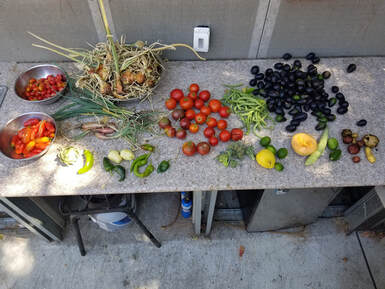 Yesterday we spent the morning harvesting the yard. I say that because we don't have a garden that's a part of the yard: we've got us a garden that is the yard. Tomatoes of various kinds, onions, leeks, shallots, cucumbers, green beans, citrus, melons, 'taters, and of course it's time of the avocado tree to be its fine and crazy self. Feel like we're getting all prepped up for the zombie apocalypse. 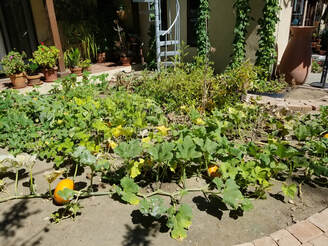 This year's addition to the yard-which-is-a-garden: the melon patch. Canteloupe, watermelon and pumpkin. Studies show that people with a garden are healthier. I'm sure it's being outside, including the sunshine but also the soil: getting those good bacteria from the dirt through our epidermis into our microbiome, and getting "grounded," as we interact with mother earth: syncing the electrical charge in our cells with the planet's. Of course, there's physical movement involved but don't forget the food. Some other wellness elements from that day come to mind. For one, a sense of purpose that transcends self and benefits others is proven to support health. We don't just grow food for ourselves, but to bless our neighborhood. People comment how much then enjoy just walking by our front yard (not a yard: a garden), and relational connections get made that otherwise wouldn't, another key to good health. Finally, I finished my day by kegging the home-brew from home grown hops: maybe my favorite part of the yard/garden. You may have noticed a stylized image of them in the Salubris logo. Sure, a lot of wellness weirdos out there will tell you to ditch the hootch. But the healthiest, longest-lived populations on the planet regularly enjoy a drink with the people they like to hang with. And hey, when you brew your own you can draw that 3-4 ounce pour from the kegerator to moderate intake, if you want to. But it can also be part of the 90-10 rule: you do it all right 90% of the time so you can enjoy some of the "off the list" stuff and not have to worry, your immune system can more than handle it. There are some nasty zombies out there. Some of them are making us stay home and worry about getting sick, but around here we're doing what we can to beat them off: all the things we can for immune support, being a part of the community and helping others, and enjoying whatever fruits (and vegies) life and the place we live have to offer.
Ain't afraid of no zombies 'round here. Here we stand on the precipice of returning to work with everyone wondering what that will actually entail and how we’re going to stay productive and healthy in our work environments. In that context, I couldn’t help but think about something we continue to hold on to in America, which is a system we call “employer based health care.” It strikes me that the intersection of health and employment has taken on entirely new dimensions and I think that our current situation gives us the opportunity to explore what best practices really mean when it comes to wellness and work.
At the risk of sounding like I’m ranting (OK, that’s not really a risk with me, but an inevitability), I first of all need to say that in my opinion we do not really have a health care system in America. What we have is a disease management system, something that we normally utilize after symptoms have manifested themselves and which in far too many cases addresses those symptoms rather than their causes, usually with pills and procedures. Einstein reminded us that “in every crisis is an opportunity,” and it seems to me that what Covid-19 has done for us is to put on the table in a more robust way the topic of prevention, something that is absolutely necessary if we are ever to move away from just disease management and into actual health care. Although some of the conversation is certainly about treatment, the vast majority of it seems to me to be all about how to keep from contracting this disease as well as how to keep others from doing so. Social distancing, face coverings, hand washing, cleaning and disinfecting surfaces… those are all preventative measures, and things that employers will have to decide how and when and whether to implement. We are awash, if you’ll excuse the expression, with information and opinions about those things, but I rarely hear talk about the most powerful weapon we have in our arsenal to prevent this disease, or most others for that matter: our own immune systems. I certainly believe that an actual health care system can and should be individual, as well as based in family and community structures. But in addition to the other measures we take I also believe that the work environment has an important role to play in making sure we have at our disposal the most powerful tool we have, which is our immune system. For one thing, we know that at least 70% of our immune function resides in our gut, the health of which is determined by what we eat. An increasing number of employers are offering food as a convenience for their employees, but it can be so much more than that. Our addiction to the kinds of foods that can make us sick is a huge part of why this pandemic is so harmful. But if a company focuses on helping access the kinds of nutrition that actually support a robust immune response then to that extent they really are part of an employer based health care system. In our current situation, that comes close in my mind to being a moral imperative for an employer. In my years of exposure to this topic I have come to see the other two aspects of the “three legged stool of wellness” as fitness and stress management, both of which materially affect the ability of our immune response to repel unwanted invaders. The ability of an employer to encourage daily movement varies, but I’m sure there is always something that can be done as a company culture to affirm the value of that. But let’s face it: nobody needs to debate whether our work life can be a source of stress. As the context in which we push ourselves to fully utilize our skills and gifts and education to make our contribution, there should always be some of that. And some stress is good for us. But toxic amounts, especially if they become chronic, will destroy our ability to keep from getting ill even if we do everything else right. It could be that for some business leaders our experience with sheltering in place will afford an opportunity to consider more deeply what a healthy work life balance looks like and how that can be supported for their employees. I also note that the concept of mindfulness has emerged from the world of weirdness and woo-woo and into the mainstream, and many companies are helping their employees understand how to employ basic techniques of Mindfulness Based Stress Reduction (MBSR). These are simple and easily applied to keep the inevitable stressful situations we face at work (and elsewhere) from being something that undermines our body’s immune function. Yes, we need and deserve the best disease management system we can create, because clearly stuff happens. But If this pandemic has taught us anything, it should be that we absolutely need a good healthcare system as well: something that fully supports our own natural abilities to prevent the diseases that from time to time wander through our world, or are simply always around to some degree, attempting to wreak havoc. They will always cause some trouble, but havoc is optional. I have my own opinions about whether our employers are the best or most efficient way of providing resources to manage our diseases, but I absolutely believe they can and should play a critical role in our health care. And that’s good for business. Lockdowns can be expensive, and employees who know that their company is supportive of their health will surely be the kind that will help a company reach its objectives. Also, we are now more aware than ever of the importance of having a healthy work environment, and that is going to start with the employees themselves coming to work with the ultimate weapon of immune support fully locked and loaded. I had someone ask me about getting some meals from the Nutrition Kitchen for a friend who struggles with weight loss. I applaud that instinct, and that is the best kind of friend: someone who wants to give something more life transforming than a bright and shiny bauble to play with for awhile before it goes to Goodwill. I've written gift certificates of that nature before, and don't do that anymore for a few reasons. For one thing, they often don't get redeemed and I end up getting paid for something I never do. That may sound like a good thing, but to me it's one iteration of a toxic relationship to money that has helped our society stray off the path of Salubris. Most importantly, though, it ends up being more symbolic than substantive with regard to the actual goal. Excess weight is just a symptom of a lack of Salubris, of wholeness, in your systems and requires a more holistic approach than just getting some healthy meals for awhile. So I thought about what I might want to give a friend based on what I know and have experienced about what really works, and here's the framework I came up with.
-A conversation with myself as a certified health coach regarding the various lifestyle aspects that go into weight management. -A consultation with Evelyn, my trainer and partner here at Salubris, to talk about what kind of movement would work best for your body and how to incorporate that into your lifestyle. -Access to my Mindfulness based stress management program: an 8 week training course delivered in bits each week to your email inbox to train you in the basic techniques that will help you avoid over-production of the hormones that cause you to store nutrients as fat regardless of how healthy they are. -3-4 weeks access to complete nutrition from the Nutrition Kitchen: breakfast, lunch and dinner. This can take the form of actual delivered meals or access to my menu planning and recipes with on-line training on how to cook them (in development: as I write this only available in person). Start with the "clean" version for a couple weeks (gluten free, dairy free) and add back in common culprits for inflammation to get to know your body a little better. -A follow up conversation with me to talk about what kind of lifestyle program is realistic and desirable based on the information they have received and food they have experienced in order to create a strategy for overall wellness (which will naturally include weight management) that will last a lifetime. That seems to me to be a gift with the potential to truly transform. At the very least they will go away knowing more about themselves and what it is that is currently working for people so they can take that with them and do with it what they choose. It could be that in the end they will look back on that as one of the happiest birthdays ever: adding years to your life and life to your years strikes me as a pretty happy outcome. 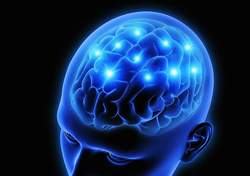 Recently I ran into an interesting, but truly frightening statistic. It was suggested to me that, given the prevalence and the trajectory of chronic neuro-degenerative disease in our culture today, at the age of 85 I will have a 50-50 chance of being diagnosed with Alzheimer’s disease. Literally a coin toss. That scares the (fill in the blank with your favorite invective: make it nasty) out of me. During the same seminar I was listening to on the connection between brain health and the microbiome, I was informed that the time between the onset of that disease and symptoms actually occurring is 20-25 years. Since I recently passed my 60th birthday, that puts me at the point of still being able to do whatever is possible to get those 50-50 odds back in my favor. Right around that time I also happened to run into one of the best articles I’ve read yet regarding the various factors that can affect the neuro-plasticity of the brain, the ability we all have to continually repair and rewire the brain for long term health and function. Thus was born the Young Brains Project, a commitment that my wife and myself, along with a couple of friends also in our stage of life, have to understanding and applying these various factors as best we can for the next 25 years and beyond. Here are some things affecting brain health with a couple of brief thoughts as to how I might try to keep my brain young for the duration. Aerobic exercise. Movement that qualifies as aerobic doesn’t just help our muscles and heart, but also our brain, not just with increasing blood flow, but having a significant impact on the negative consequences of stress as it serves to train our fight-or-flight response, our “monkey brain,” informing it that our actual brain is really in control, so you can just swing back up into the trees, thank you very much. I love my morning jogs and backyard workouts by myself as well as the real ones with our trainer. But we’re also in the process of taking it to another level as we transform our garage into a functional gym for her to work out of. Maybe we’ll see you there sometime! Emotional health. Fostering healthy emotional attitudes such as gratitude and compassion and healthy, secure relationships based on trust also foster neuroplasticity. Actual dinners and/or happy hours with family where we talk about life and support each other is an important value for us. We also are playing around with Mindfulness Mondays, a time to gather with people interested in exploring topics and practices around managing stress, as well as a Wednesday night meetup for those of us who need a safe place to process questions, doubts and hurts regarding the religion we grew up with that has become either questionable or toxic. I am personally convinced that a healthy and positive spiritual practice belongs on this list. Unfortunately, de-toxing from one based on fear and shame is sometimes a prerequisite to achieving that as you free yourself from a worldview that creates rather than alleviates your stress. And then, of course, there’s always what happens on weekends around the backyard BBQ, Pizza Oven and Firepit with whoever wants to hang out. Environmental enrichment. Things that stimulate our senses and that challenge our motor abilities and social engagement are critical to keeping our brain active and hence, healthy. The author mentions as examples playing a musical instrument, hiking, traveling, dancing, etc. I’m in. If I could find some people to play guitar with again I’d be way in, especially something that would justify a big stack of amplifiers that go up to 11. For now, maybe I’ll just keep playing it around the firepit. And it’s still on my bucket list to learn to play the piano and another language. Rhonda and I have begun to get hikes back on the calendar and certainly want to begin prioritizing travel for the next few decades. And by all means, let’s dance. Crazy how sitting around watching TV didn’t show up on the author’s list, what’s up with that? Meditation. With regard to current scientific research on increasing brain neuroplasticity, I would be surprised to learn that anything receives more attention then this. My meditative practice for years has been contemplative prayer, but has been far too on again, off again, especially in busy times of stress when I need it the most. I am very committed to cementing and enhancing principles of mindful meditation in my life and I’m sure that various ways to accomplish this will be a subject that will be coming up on Mondays as well. Nutrition and Inflammation. I have been nearly overwhelmed lately with all the research being done on the connection between our gut and our brain. Neuro-degenerative diseases, like any auto-immune disease, can all be traced back to inflammation which doesn’t typically start in the brain, but travels to it: primarily from the gut. The right nutrition that avoids inflammation and the leaky gut that gives it the opportunity to travel to the brain is, of course, what the Nutrition Kitchen is all about and something which will always be a part of our long term healthy aging plan, including avoiding cognitive decline. Physical touch. Yes the mind and body (and the spirit) are inter-related. By touch, of course, we’re not talking fisticuffs. In the context of safety and love, physical touch is healthy for the brain. We’ll continue our regular massage sessions here at home, and more hugs! Relaxation and deep breathing. Breathing is the one autonomic function we have control over, and learning the techniques that turn off our fight-or-flight response in situations where we don’t actually need it to survive is one of the most useful things we can do maintain brain health. Learning and practicing these, not just in meditation but throughout the day, will continue to be a focus. Sleep. This is so necessary to restore and repair all of the bodily functions, but the neuroplasticity of the brain is one of the major beneficiaries. How to assure restful sleep is a post to itself, but I do particularly like this one, I’m not going to lie. Not everyone is wired for them, but I particularly enjoy using this to justify my afternoon naps in the sunshine. Substance use. It goes without saying that things like smoking and excessive alcohol consumption are not going to help the brain age well. But hey, that’s why I brew beer: so I can pour just a half glass at a time from the keg. 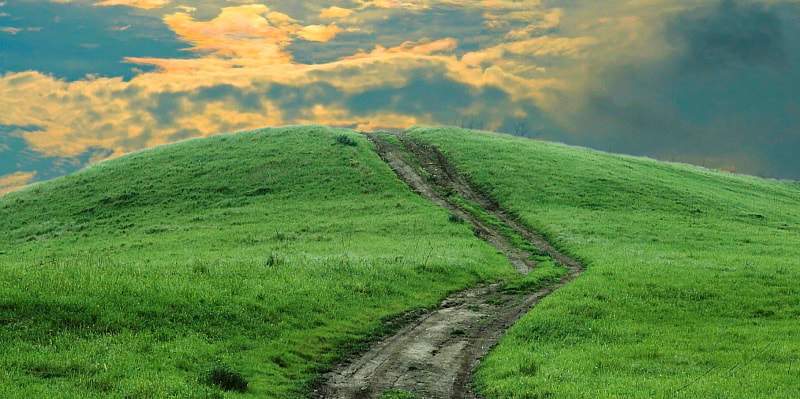 First of all, let me just state that I am actually a fan of opportunities such as New Year’s when we sit back and take a big picture look at our lives, re-commit ourselves to the things that we think are really important, and do a re-set of any of the aspects of our lives that do not correspond with those. Personally, I like to use birthdays and the turn of the year for that activity: two things that happen just because the earth is managing to move around the sun, not because of anything I did. That strikes me as appropriately humbling in some way. It helps me ask, “Since this planet is going to keep on spinning on its path regardless of what I do, how do I make a difference with the time I’ve got?” For me those two events every year are just about equa-distant on the calendar, so they work well as two opportunities throughout the year to re-calibrate. That’s why on my birthday you’ll find me placing more emphasis on managing a long walk in the woods than on throwing a big party. Then I come down and have a clambake and drink some home brew. Those are the big opportunities, but I actually think that to be really transformative this sort of activity also needs to focus on the fact that the earth is not just moving around the sun annually, but spinning on its axis daily. And we don’t have anything to do with that either: so what can we do today that is under our control that will actually mean something? New Year’s resolutions strike me as very similar to diets: they don’t work, or at least that’s what most of the research would lead us to believe. I think that’s because at the same time they’re too short term as well as too long term. Too short term because they imply a one time thing, something you’ll accomplish this year (or in the case of a diet, 6 months or 30 days or until I lose so many pounds or whatever other useless marker someone is trying to sell you). And too long term because any truly transformative change that is going to go the distance is going to be about what you do today, or even this moment that you’re currently living in. As I stated, I think it’s great to set goals and have a big picture in mind. But what is going to help you to evolve into achieving those goals is going to be more about the little things you do every day. Maybe one of the questions we should be asking is how small a step can I take in the various aspects of life that make up my wellness? For instance: Nutrition. Rather than how many pounds am I going to lose, or how radically can I transform what I eat, how can I add a few more vegies to my plate, or another color to those vegies instead of just green, or one fewer source of refined carbohydrates (sugared drink, piece of white bread, donut, etc.). Fitness. Rather than obsessing about how far you have to go to become an iron-person, how can you get a little more movement in my day? Take a little longer walk? Take a walk at all? Park in the back of the lot and walk to the store? Take that one flight of stairs to the office instead of the elevator? Two more reps with your exercises? Stress management (my “everything else” category). Instead of jumping to a 30 minute deep meditative experience every day, where is space that you can carve out for a few minutes to just unplug and breathe deep? Instead of worrying about single-handedly solving the homeless problem or resettling every refugee, what is something you can do for someone around you today that adds some value to their life? Instead of obsessing over that person who did that horrible thing years ago , how can you give a pass to the person who cuts you off in traffic or puts you on hold again, and train yourself in little things to one day let go of the grudges that are still compromising your immune system and cutting years out of your life? I could go on regarding whatever is making your cortisol flow. Ask any financial advisor, for instance, who will tell you that it is the little things done consistently that will transform that aspect of your life over time. For me, the important thing about that is to every day share with other people or do something else to let go of these things in order to remind myself of how little importance that really has in how significant my life will be in the end. You get the picture. By that I mean the little daily sketch you make of some aspect of your life, not the big painting on the ceiling of the chapel that those sketches will eventually create. The problem with big resolutions is that they focus on the significant goals down the road, something that can be daunting and unmotivating. Put more than one or two of them together and they can seem downright unachievable. And the reality is that you may not achieve them at all, because you choose not to: in the process of the evolution in that direction, you may discover that your goals and values change over time: or that you as an individual have a mind, body and spirit that requires a slightly different mix and methodology of the components to your wellness than what the “experts” tell you. You are the expert on you, and the secret to discovering the intricacies of what works best for you is hidden in the small and perhaps seemingly insignificant daily opportunities that you take advantage of on your journey of wellness. Maybe in the end we will discover that it wasn’t so much about where we were heading, but what direction we were heading in and taking the little steps every day along that path. Maybe in the end we will look back and discover it was more about our evolution than about our resolutions. And that we make a path by walking. Happy New Year. |
Brad KunkelChef, health coach, wellness geek, thinker about random stuff that might make life better or more meaningful Archives
December 2022
Categories |
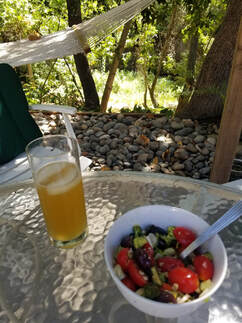
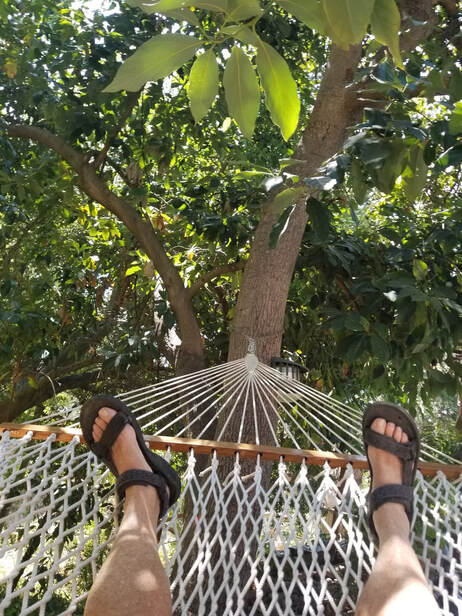
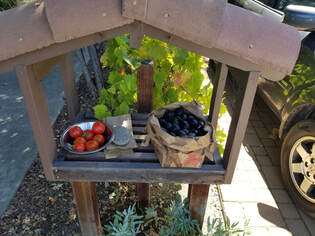
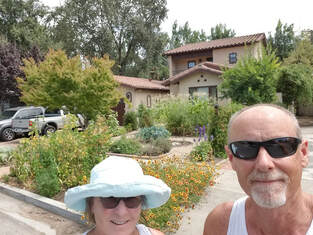
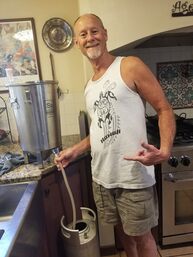
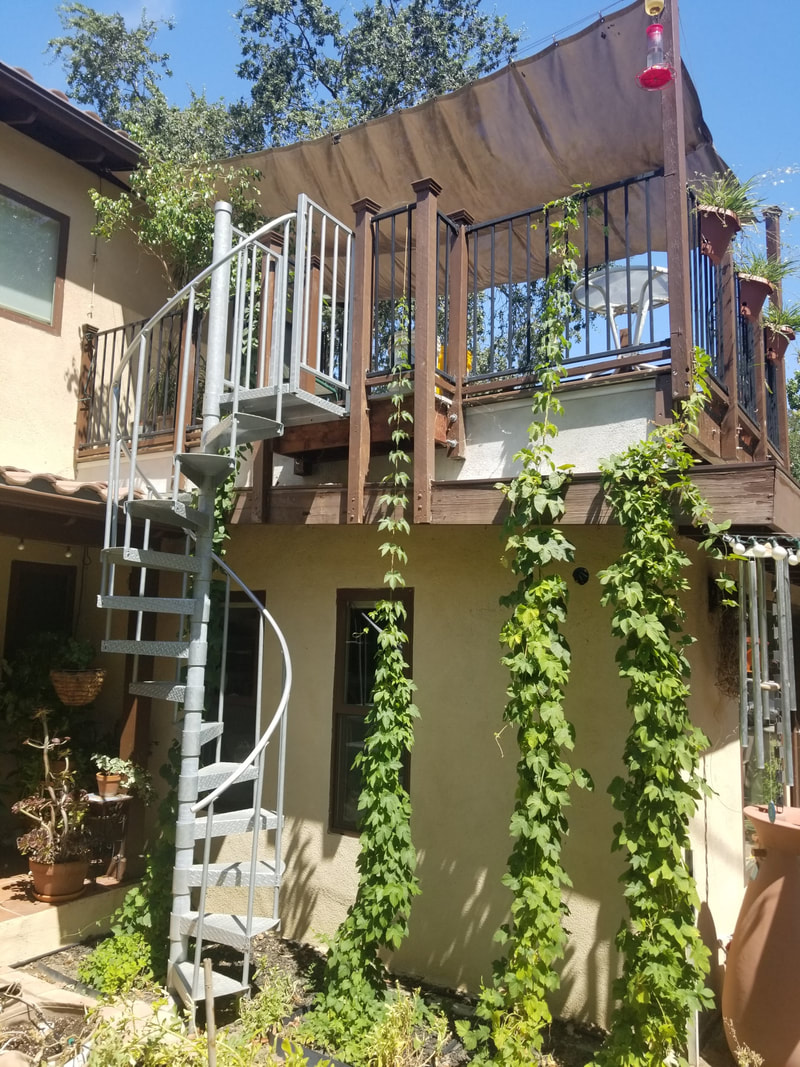
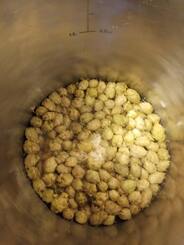
 RSS Feed
RSS Feed